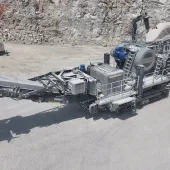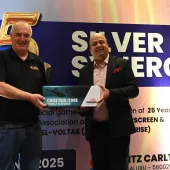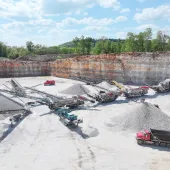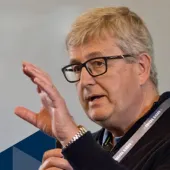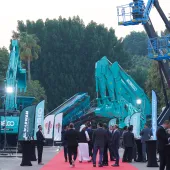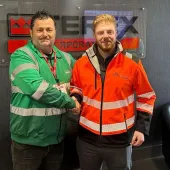Powerscreen Celebrate 50 Years

First published in the July 2016 issue of Quarry Management as Celebrating 50 Years of Power
Powerscreen mark their 50th anniversary with celebrations at Hillhead 2016 and in Northern Ireland
Powerscreen are such a well known and respected name in such a niche of the minerals processing industry that they are one of the few companies taken over by Terex not to have been subsumed by the Terex brand, even trumping the Terex Pegson name when the two business combined in 2009.
Even the Powerscreen location in Co. Tyrone, Northern Ireland, is significant. Powerscreen are celebrating their 50th anniversary this year and employ more than 1,400 people at their four sites covering 100,000m2. Employees span the generations and give the region a concentration of skills probably not seen anywhere else in the world.
Powerscreen are proud of that expertise. It gives them a comfort margin from international competitors that have come (and, in some cases, gone again) over the years.
The 50th anniversary is not being allowed to pass without celebration. It was a major theme of the company’s stand at the Hillhead exhibition in Derbyshire last month.
But the main celebration for Powerscreen’s worldwide network of distributors and major customers followed Hillhead. It was back in Northern Ireland at the Titanic Centre in Belfast, with the great gantry of the Harland & Wolf shipyard, where the Titanic was built, providing the backdrop.
The centre’s walls are reminiscent of the bow of the great ship and the sea that claimed so may of its crew and passengers. The top floor of the centre is a reconstruction of the ship’s ballroom, with its grand staircase, and it was there that 450 of Powerscreen’s distributors and customers completed the 50th anniversary celebrations on 1 July.
The Powerscreen distributors really do come from almost every corner of the world – North and South America; West, North and South Africa; the Middle and Far East; Australia and New Zealand; and, of course, all across Europe.
Some of them have represented Powerscreen for almost as long as the company has been making screens. Powerscreen of California and Hawaii have been selling them for 45 years and Powerscreen of Canada celebrated their 40th anniversary as a Powerscreen distributor last year.
Even Pat McGeary, who owns Blue Machinery Central in England, is an old friend because he was previously the factory manager at Powerscreen, giving him a provenance with the company stretching back 40 years.
‘We have an incredible depth of experience and loyalty within the network,’ said Colin Clements, Powerscreen’s global product line director. ‘It’s a collaboration that has made us and the distributors successful and helps set us apart from competitors. We have many distributors who have been with Powerscreen for more than 20 years. Some of our competitors have not even been around that long.’
Two of the three founders of Powerscreen, Pat O’Neill and Lee Mallaghan, were also among the VIPs at the 50th anniversary celebrations.
From the early days, distribution was the difference. Messrs O’Neill and Mallaghan, and the late Pat Dougan (the third founder), were among the pioneers of global distribution, as well as mobile screening. They towed a Mark II around the US behind a truck to recruit distributors. The volume of production that expanding into the US and Canada necessitated also provided the incentive and the funds for continual product development. The combination proved unstoppable.
Other guests at the Titanic Centre included politicians from Northern Ireland, along with the person described as ‘Employee Number One’. His name is Jim Joe Kilpatrick. He was, in fact, one of three people who started working for Powerscreen on 7 March 1966 when they went into production with their Mark I screen.
One of those original screens still sits outside the factory in Dungannon, Co. Tyrone, where its successors are made today.
Marking half a century is inevitably a time for looking back at the landmarks leading to today’s success, not least Powerscreen becoming part of the massive Terex corporation in 1999.
But it is also a time for looking forward, and at Hillhead the focus was very much on the new products being introduced by Powerscreen and the 2012 spin-off that saw the washing systems of Powerscreen and Terex Finlay merged as Terex Washing Systems (TWS).
Washing was a small part of Powerscreen’s business that Terex identified as having growth potential. Correctly. It has grown by 30% a year since 2012.
More about the product launches can be found in the Hillhead 2016 review elsewhere in this issue. But before the Hillhead show opened, Quarry Management visited Powerscreen and TWS at their headquarters in Dungannon to find out more about developments at the businesses.
Powerscreen moved on to the site they now occupy in Dungannon in the early 1970s, although they only crossed the road from what is now the home of Chieftain Trailers.
Colin Clements took over responsibility for the Dungannon facility in 2014. He reports to Kieran Hegarty, who is president of Terex Materials Processing, one of the five main business categories of Terex.
Mr Clements believes the retention of the globally recognized Powerscreen name is an indication of how Terex run the operation, achieving economies by avoiding duplication of functions (such as accounting) but encouraging a level of autonomy that keeps the business sharply customer focused.
As part of that focus, TWS have just opened a new £2.3 million, 2,200m2 assembly building that allows them to construct a plant completely before it is taken apart again to be delivered to a customer. Doing so identifies any errors in design that could stop the plant working. It could be something as simple as a part being just a few millimetres too short.
TWS have also launched what is called ‘4Site’, which offers various levels of project management right up to full turnkey for the smooth installation of plant, so everyone is clear who is responsible for doing and supplying what. ‘It’s about managing expectations,’ explained Oliver Donnelly, who was appointed as business line director of Terex Washing Systems in May this year.
A year earlier, a purpose-built, €6 million parts centre was opened in Dungannon ™
It is all part of a drive to maximize uptime. The new worldwide spares distribution centre goes hand in hand with the adoption of telemetry as standard in January this year. As Colin Clements explained: ‘If crushing and screening goes down there are a lot of knock-ons.’
With telemetry, sensors warn of necessary maintenance and convey the message to operators, distributors and Powerscreen. The increased level of information can save money by avoiding both failures and the replacement of parts until they need replacing.
Powerscreen hope the additional information being gathered will encourage more operators to contract servicing and maintenance of the machines to distributors using genuine Powerscreen parts, reducing the predominance of self-servicing customers currently in the industry.
Powerscreen themselves envisage that the gathering of quantifiable information from the field will help their product development by identifying where improvements could be made.
The information also provides details such as when the machine is running but not working, so operators can see where they are wasting resources and perhaps change the way they work to increase profitability/competitiveness.
This is important for all users but particularly for large contractors with 20 or 30 machines, which can now all be monitored remotely at a central control point and through an App for smartphones. And it will be important for hire firms, allowing them to track and monitor their machines.
Many operators are already familiar with the technology as it is now commonplace on many excavators, wheel loaders and dumptrucks, so resistance to it on mobile screens and crushers should be minimal.
Of course, a well maintained machine retains a higher residual value. ‘A lot of our customers change machines on a relatively regular basis,’ said Mr Clements. ‘Helping to maintain the machines keeps us in touch with those customers between replacements and we work with distributors to refurbish and redistribute used machines.’
Used machines often go to emerging markets, which gives Powerscreen an entry into companies that are not ready to start buying new equipment, often in Africa and Central and South America.
In India, Powerscreen already have their own factory (opened in 2008) and the sub-continent is a major growth market for mobile crushing and screening – there were some 22 visitors from India at the 50th anniversary celebrations.
The machines being made for the Indian market use locally supplied components, particularly engines, so they can be serviced by local people who are familiar with them.
One significant region that remains untapped so far is China. It is on the radar as a medium-term objective, but, said Mr Clements: ‘We have a lot of other markets that we believe have greater potential first.’
With a population of somewhere between 1.3 billion and 1.6 billion (depending whose figures you choose to believe), China has huge potential. But it also has a lot of its own manufacturers making cheap crushers and screens. And it is also not unheard of for machines sold to China to be used as templates for the production of Chinese exports.
The market in the developed world is mature, but still has some growth potential through an increasing intolerance of waste going to landfill.
There are good reasons for processing materials on site at many demolition and reclamation projects, and that lends itself to the use of mobile crushers and screens.
This is an established part of Powerscreen’s business that the company can only see increasing.
Another development is electrically powered equipment. Bauma saw Powerscreen’s first venture into this area with the Warrior 1400 XE electrical scalping screen.
It is the company’s response to a call from customers for lower emissions and lower fuel prices, perhaps with particular relevance to demolition and recycling, although there are quarries with massive generators that tracked screens could be plugged into.
‘We would see electric-drive equipment as a complementary line to diesel-hydraulic, although we see diesel-hydraulic remaining top of the pile for a long time yet because of its flexibility,’ said Mr Clements.
Oliver Donnelly is keen to emphasize the problem-solving capabilities of Terex Washing Systems. ‘The machines are improving, but there’s a lot more to TWS than just metal; we have the ability to deliver our promises. It’s a little bit more effort from our side to deliver a lot more for the customer.’
And to conclude, Mr Clements summed up like this: ‘Over the past 50 years Powerscreen have been a pioneer in getting tracked mobile crushers and screens adopted as a prevalent piece of equipment in traditional markets. In the next 50 years we will be aiming to convert the rest of the world.’
• Subscribe to Quarry Management, the monthly journal for the mineral products industry, to read articles before they appear on Agg-Net.com


